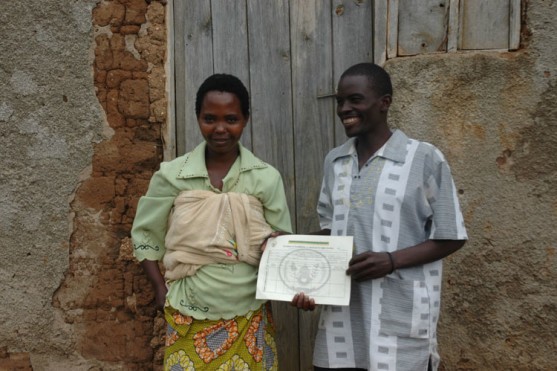By Chris Jochnick, Landesa
Technology and social networks are the oft-cited parents of the sharing economy.
The two are largely credited with enabling us to trust strangers with our stuff, our homes and our lives – unlocking vast economic value in what was heretofore dead or underused capital.
But this reading of the sharing economy misses perhaps the most critical foundation of this system: paper. Specifically, legal papers related to property such as deeds, titles, leases and the institutions that uphold them.
It is this infrastructure of laws and institutions that create a foundation in which trust is possible. When these laws and institutions function properly we gain the ability to transfer property (temporarily or permanently), which is critical to economic development. So we can rent out our homes without fear of the renter taking it over and refusing to move out; we can rent out our cars and know they will be returned. Likewise, a tenant farmer can rent land for a season or a year and invest in that land without fear that the landowner will reclaim it just as the crop is ripe for the picking.
When this web of laws and institutions is absent or non-functioning, such arrangements don’t end well. Which is why the sharing economy is so instructive for our efforts to address poverty in the developing world where legal systems related to land and property are often absent or function poorly. Indeed, as the sharing economy has taken root, vast quantities of dead capital (underused cars, homes and labor) have come to life. This is exactly what is needed in the developing world.
Consider the case of sub-Saharan Africa. An estimated 90 percent of the land in Africa is undocumented, according to the World Bank.
This lack of legal certainty means that a farmer would be reluctant to rent out surplus farmland to those without enough access to land because she doesn’t have legal rights to it and is worried about getting it back from the renter. This lack of legal certainty casts an even longer shadow on the farmer’s opportunities: It creates a disincentive for that farmer – or those to whom she rents her land – to invest in that land. Any investment in the land, such as the application of high-quality fertilizer or upgrades to irrigation, make the land more valuable and more attractive to others (such as powerful neighbors or relatives), thereby increasing the risk of appropriation.
So while a homeowner in California is free to rent out his or her home while away for the summer and maximize ROI, a farmer in Uganda minimizes her input, both labor and financial, as a reaction to a perceived high risk of losing that land and any investment made in it.
Not surprisingly, this is a recipe for small harvests and enduring poverty.
Beyond the stranglehold it places on farmers’ ability to advance, it also diminishes their interest in protecting their land for future generations. (Why preserve a tree if there is a chance your neighbor will chop it down and steal the wood?) And it impacts the type of crop grown. (Think fast and cheap.)
The lack of a functioning property rights regime does not just restrict how farmers in much of the world can leverage their property, it impacts how they leverage their own labor. And labor is typically a poor family’s most abundant resource.
In one study, researchers found that families with legal and secure rights to their land worked, on average, 17 percent more hours every week. Researchers found that they did so because they didn’t have to sit at home or in their fields and protect their property from intruders. The developing world’s farmers need the security to work, plan and invest more and worry less.
Despite the obvious benefits, most of the world’s poorest women and men, an estimated 1 billion people, do not have secure rights to land and property.
As developing countries progress, governments need to create effective paths out of farming and into manufacturing to grow their economies. They need to ensure that families can transfer their land through market mechanisms to others when they exit farming. Without this ability, too many families are forced to migrate penniless to cities where they become part of the marginalized urban squatter population.
There is an alternative.
Countries, most notably Rwanda, have in recent years transformed their property rights and land tenure systems to convert terra incognita into formalized parcels with legal owners. This can apply to a variety of different “ownership-like” systems (individual or communal) and can provide a key window for strengthening property rights for women and communities – key to achieving larger development gains.
Research shows farmers respond to legally recognized property rights by increasing their investment in the land to improve their harvests. And research likewise shows that women with secure rights to land plow those gains back into their families.
Such efforts need to be supported and broadened.
Donor agencies and the international development community should look to the legal infrastructure that allows our sharing economy’s Ubers and Airbnbs to thrive, and recognize the need to support secure property rights in Africa, Asia and Latin America.
Because, ultimately, you can’t share something that you don’t own in the first place.
Chris Jochnick is Chief Executive Officer of Landesa.

